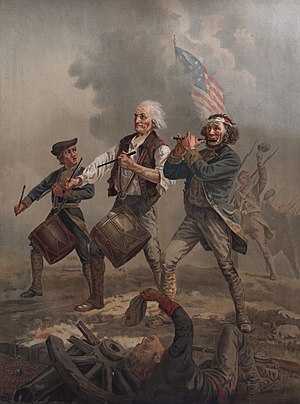Spirit of '76 (sentiment)
| The Spirit of '76 | |
|---|---|
 |
|
| Artist | Archibald MacNeal Willard |
| Year | 1875 |
| Type | Oil |
| Location | Abbot Hall in Marblehead, Massachusetts |
The Spirit of '76 is a patriotic sentiment typified by the zeitgeist surrounding the American Revolution. It refers to the attitude of self-determination and individual liberty made manifest in the Declaration of Independence.
The Spirit of '76 is a sentiment explored by Thomas Jefferson. According to text published by UNESCO World Heritage Site Monticello, "The principles outlined in the Declaration of Independence promised to lead America—and other nations on the globe—into a new era of freedom. The revolution begun by Americans on July 4, 1776 would never end. It would inspire all peoples living under the burden of oppression and ignorance to open their eyes to the rights of mankind, to overturn the power of tyrants, and to declare the triumph of equality over inequality."
Thomas Jewett wrote that at the time of the American Revolution, there was "an intangible something that is known as the 'Spirit of '76.' This spirit was personified by the beliefs and actions of that almost mythical group known as the Founding Fathers, and is perhaps best exemplified by Thomas Jefferson."
Jefferson and the Second Continental Congress believed the Spirit of '76 "included the 'self-evident' truths of being 'created equal' and being 'endowed by their Creator with certain inalienable rights' including 'life, liberty, and the pursuit of happiness.'"
According to the New York Times, in a review of What Kind of Nation: Thomas Jefferson, John Marshall, and the Epic Struggle to Create a United States:
Jefferson's core conviction was that what might be called 'the spirit of '76' had repudiated all energetic expressions of government power, most especially power exercised from faraway places, which included London, Philadelphia or Washington. In terms of domestic policy, he believed the states were sovereign and the federal government established by the Constitution was, as he put it, 'a foreign government.' Marshall's core conviction was that the spirit of '87 had trumped the spirit of '76, transforming the loose confederation of states into a coherent nation guided by a duly elected federal government empowered to make laws for all the American people.
...
Wikipedia
